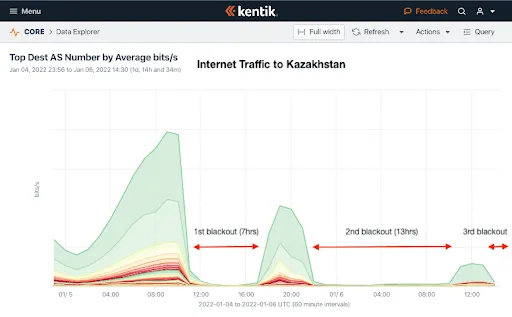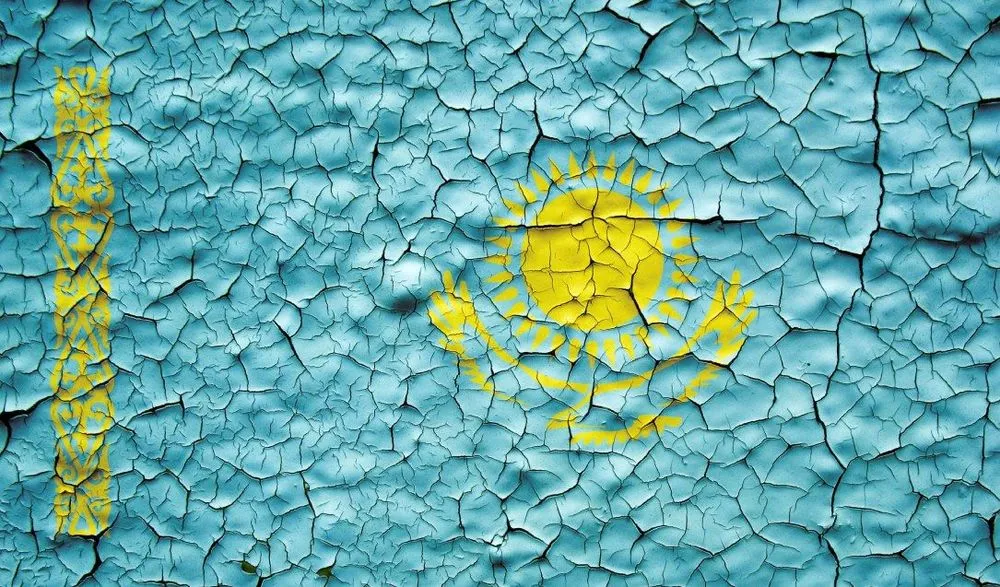Massive internet outages continue to sow confusion amid Kazakhstan protests
Nation-level internet traffic was cut off in Kazakhstan this week in the latest example of a petrostate trying to use shutdowns to quell protests and sow confusion.
Early reports of communications disruptions started coming in on January 2, the first day people took to the streets in Almaty and other cities to protest fuel price increases and deteriorating economic conditions. Those reports were limited to localized mobile network interference and blocks on traffic to certain messaging services, including Telegram and Signal, Natalia Krapiva, Tech Legal Counsel at digital rights group Access Now said.
The first wave of broad internet shutdowns started at 4:45 pm local time on January 5, according to data from network monitoring firm Kentik. Internet service was again disrupted early Thursday, according to NetBlocks.
#Cabassous (#FluBot) actors are heavily developing new overlay targets and also performing an environmental checks (av) before it executing the banker payload. Interesting new countries and developments coming from this private group in such a short period of time. pic.twitter.com/0pWXHaMa1j
— ThreatFabric (@ThreatFabric) April 26, 2021
Access remained out for hours at a time amid deadly clashes between police and protesters after a rise in fuel prices when the government lifted price controls while facing an energy infrastructure crisis driven, in part, by cryptocurrency mining.
“The government of Kazakhstan has executed multiple national internet blackouts in response to widespread anti-government protests,” Doug Madory, director of internet analysis at Kentik told The Record.
The situation on the ground remains in turmoil, with President Kassym-Jomart Tokayev dissolving his cabinet and calling in aid from other former Soviet-bloc allies, but follows a pattern of fossil fuel dependent autocrats taking their nation’s internet offline in apparent attempts to silence domestic dissent and limit international coverage.
In some cases, including during protests in Sudan in 2013 and in Iran in 2019, such shutdowns were also in direct response to energy-market related economic stress.
The tactic is a human rights violation that limits the Kazakh people’s freedom of expression and disrupts local people's lives in a major way by shutting down access to things like health and financial services that depend on the web, said Krapiva.
Internet shutdowns also often backfire, she said, causing further economic unrest and driving more people into the streets in search of answers.
“It’s not just about the internet, it’s about a larger impact. To be honest, the government should understand that—especially since the reasons for this particular protest are economic,” Krapiva said.

Image: Kentik
A Cryptocurrency Hub
Kazakhstan may at first glance look like a financial success story compared to many of its post-Soviet neighbors, thanks largely to an energy sector fueled by vast oil reserves in a western region. However, there’s also rampant economic inequality and corruption—the hallmarks of a petrostate where extraction of fossil fuels primarily benefits those in power.
And a major way autocratic leaders of such states often maintain control is subsidizing local fuel prices.
But over the last year, the cheap local energy prices and a crackdown on cryptocurrency in neighboring China propelled the country into being one of the biggest hubs for cryptocurrency mining in the world—much of it funded by outside investors fleeing regulation in China.
Because the process of mining bitcoin—which is necessary to maintain the network it relies on—expends huge amounts of energy, this system essentially extracted even more from the country financially and environmentally while pushing the electrical grid infrastructure local people depended on to the breaking point.
“They took advantage of that situation and it created a lot of strain on the infrastructure,” Krapiva said. “The state of authoritarian infrastructure is not reliable to begin with and this created additional stress.”
At the same time, domestic shortages in propane and butane—which is relied on by many of the country’s poorest people—driven by foreign companies exporting local fuel to other markets where they could sell it for higher prices, inflamed existing tensions over living conditions in the country heading into winter.
The government took steps to attempt to regulate the cryptocurrency industry’s energy consumption in November, but then on January 1st a domestic fuel pricing reform aimed at keeping more propane and butane inside the country backfired—pushing prices for them up and people on the streets.
The protests were still rolling on Wednesday when the nation-wide online blackouts began. The first outage lasted several hours before access was temporarily restored around when Tokayev called for foreign assistance, denounced the protestors as terrorists, and promised unspecified reforms, according to Madory.
The same evening protesters set fire to the presidential residence.
Andrea Peterson
(they/them) is a longtime cybersecurity journalist who cut their teeth covering technology policy at ThinkProgress (RIP) and The Washington Post before doing deep-dive public records investigations at the Project on Government Oversight and American Oversight.



